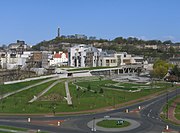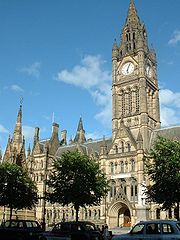| Главная » Статьи » Английский язык » Тематические тексты |
Government and politics

HM Queen Elizabeth II The United Kingdom is a constitutional monarchy with Queen Elizabeth II as head of state; the monarch of the UK also serves as head of state of fifteen other Commonwealth countries, putting the UK in a personal union with those other states. The Crown has sovereignty over the Isle of Man and the Bailiwicks of Jersey and Guernsey. Collectively, these three territories are known as the Crown Dependencies which are lands owned by the British monarch but not part of the United Kingdom, though the UK Parliament has the authority to legislate for them and the UK government manages their foreign affairs and defence. The Constitution of the United Kingdom governs the legal framework of the country and consists mostly of written sources, including statutes, judge made case law, and international treaties. As there is no technical difference between ordinary statutes and law considered to be "constitutional law," the British Parliament can perform "constitutional reform" simply by passing Acts of Parliament and thus has the power to change or abolish almost any written or unwritten element of the constitution. However, no Parliament can pass laws that future Parliaments cannot change.[33] The United Kingdom is one of the three countries in the world today that does not have a codified constitution (the other two being New Zealand and Israel).[34] 
The UK's remaining overseas territories The UK has a parliamentary government based on the Westminster system that has been emulated around the world — a legacy of the British Empire. The Parliament of the United Kingdom that meets in the Palace of Westminster has two houses: an elected House of Commons and an appointed House of Lords, and any Bill passed requires Royal Assent to become law. It is the ultimate legislative authority in the United Kingdom since the devolved parliament in Scotland and devolved assemblies in Northern Ireland, and Wales are not sovereign bodies and could be abolished by the UK parliament despite being established following public approval as expressed in referenda. 
The Houses of Parliament The position of Prime Minister, the UK's head of government, belongs to the Member of Parliament who can obtain the confidence of a majority in the House of Commons, usually the current leader of the largest political party in that chamber. The Prime Minister and Cabinet are formally appointed by the Monarch to form Her Majesty's Government. Though the Prime Minister chooses the Cabinet, and by convention HM The Queen respects the Prime Minister's choices. The Cabinet is traditionally drawn from members of the Prime Minister's party in both legislative houses, and mostly from the House of Commons, to which they are responsible. Executive power is exercised by the Prime Minister and Cabinet, all of whom are sworn into Her Majesty's Most Honourable Privy Council, and become Ministers of the Crown. The Rt Hon Gordon Brown MP, leader of the Labour Party, has been Prime Minister, First Lord of the Treasury and Minister for the Civil Service since 27 June 2007.[35] For elections to the House of Commons, the UK is currently divided into 646 constituencies, with 529 in England, 18 in Northern Ireland, 59 in Scotland and 40 in Wales,[36] though this number will rise to 650 at the next General Election. Each constituency elects one Member of Parliament by simple plurality. General Elections are called by the Monarch when the Prime Minister so advises. Though there is no minimum term for a Parliament, the Parliament Act (1911) requires that a new election must be called within five years of the previous general election. The UK's three major political parties are the Labour Party, the Conservative Party, and the Liberal Democrats, who won between them 616 out of the 646 seats available in the House of Commons at the 2005 general election. Most of the remaining seats were won by parties that only contest elections in one part of the UK such as the Scottish National Party (Scotland only), Plaid Cymru (Wales only), and the Democratic Unionist Party, Social Democratic and Labour Party, Ulster Unionist Party, and Sinn Féin (Northern Ireland only, though Sinn Féin also contests elections in Ireland). In accordance with party policy, no elected Sinn Féin Member of Parliament has ever attended the House of Commons to speak in the House on behalf of their constituents as Members of Parliament are required to take an oath of allegiance to the Monarch.[37] For elections to the European Parliament, the UK has 78 MEPs, elected in 12 multi-member constituencies.[38] Questions over sovereignty have been brought forward due to the UK's membership of the European Union.[39] Devolved national administrations

Scottish Parliament is the national legislature of Scotland. 
Parliament Buildings in Stormont, Belfast, seat of the assembly Northern Ireland, Scotland and Wales each has its own government or Executive, led by a First Minister, and a devolved, unicameral legislature. England, the largest country of the United Kingdom, has no devolved executive or legislature and is administered and legislated for directly by the UK government and parliament on all issues. This situation has given rise to the so-called West Lothian question which concerns the fact that MPs from Northern Ireland, Scotland and Wales can vote, sometimes decisively,[40] on matters affecting England that are handled by devolved legislatures for their own constituencies.[41] The Scottish Government and Parliament have wide ranging powers over any matter that has not been specifically 'reserved' to the UK parliament, including education, healthcare, Scots law and local government.[42] Following their victory at the 2007 elections, the pro-independence SNP formed a minority government with its leader, Alex Salmond, becoming First Minister of Scotland.[43] The pro-union parties responded to the electoral success of the SNP by creating a Commission to examine the case for devolving additional powers while excluding Scottish independence as an option,[44] though the then leader of the Scottish Labour Party, Wendy Alexander, indicated that Labour would support calls for independence to be placed before the people in a referendum in the hope that a vote to reject independence would settle the constitutional debate for a generation.[45] The Welsh Assembly Government and the National Assembly for Wales have more limited powers than those devolved to Scotland,[46] although following the passing of the Government of Wales Act 2006, the Assembly can now legislate in some areas through Legislative Competency Orders which can be granted on a case by case basis.[47] The current Welsh Assembly Government was formed several weeks after the 2007 elections, following a brief period of minority administration, when Plaid Cymru joined Labour in a coalition government under the continuing leadership of First Minister Rhodri Morgan. The Northern Ireland Executive and Assembly have powers closer to those already devolved to Scotland. The Northern Ireland Executive is currently led by First Minister Peter Robinson (Democratic Unionist Party) and deputy First Minister Martin McGuinness (Sinn Féin).[48] Local government
Manchester Town Hall, used for the local governance of Manchester, is an example of Victorian era Gothic revival architecture. The history of local government in the United Kingdom is marked by little change in the arrangements that preceded the Union until the 19th century, after which there has been a constant evolution of role and function.[49] Change did not occur in England, Northern Ireland, Scotland and Wales in a uniform manner and the devolution of power over local government to Scotland, Wales and Northern Ireland means that future changes are unlikely to be uniform either. The organisation of local government in England is complex, with the distribution of functions varying according to the local arrangements. Legislation concerning local government in England is decided by the UK parliament and the government of the United Kingdom, because England does not have a devolved parliament. The upper-tier subdivisions of England are the nine Government office regions or European Union government office regions.[50] One region, Greater London, has had a directly elected assembly and mayor since 2000 following popular support for the proposal in a referendum.[51] It was intended that other regions would also be given their own elected regional assemblies but a rejection by a referendum in 2004 of a proposed assembly in the North East region stopped this idea in its tracks.[52] Below the region level, London consists of 32 London boroughs and the rest of England has either county councils and district councils or unitary authorities. Councillors are elected by First Past The Post in single member wards or by the multi-member plurality system in multi-member wards.[53] Local government in Northern Ireland has, since 1973, been organised into 26 district councils, each elected by single transferable vote with powers limited to services like collecting waste, controlling dogs, and maintaining parks and cemeteries.[54] However, on 13 March 2008, the Executive agreed on proposals to create 11 new councils to replace the present system[55] and the next local elections will be postponed until 2011 to facilitate this.[56] Local government in Scotland is divided on a basis of 32 council areas with wide variation in both size and population. The cities of Glasgow, Edinburgh, Aberdeen and Dundee are separate council areas as also is Highland Council which includes a third of Scotland's area but just over 200,000 people. The power invested in local authorities is administered by elected councillors, of which there are currently 1,222[57] who are each paid a part-time salary. Elections are conducted by single transferable vote in multi-member wards that elect either three or four councillors. Each council elects a Provost or Convenor to chair meetings of the council and to act as a figurehead for the area. Councillors are subject to a code of conduct enforced by the Standards Commission for Scotland.[58] The representative association of Scotland's local authorities is the Convention of Scottish Local Authorities (COSLA).[59] Local government in Wales consists of 22 unitary authorities, including the cities of Cardiff, Swansea and Newport, which are separate unitary authorities in their own right.[60] Elections are held every four years by First Past The Post[61] with the most recent elections being in May, 2008. The Welsh Local Government Association represents the interests of local authorities in Wales.[62] Источник: http://wikipedia.org | |
| Просмотров: 1391 | |
| Всего комментариев: 0 | |